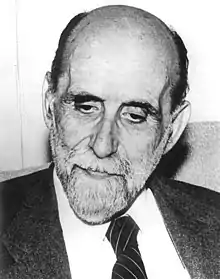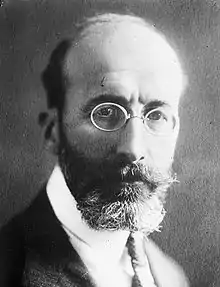1956 Nobel Prize in Literature
The 1956 Nobel Prize in Literature was awarded to the Spanish poet Juan Ramón Jiménez (1881–1958) "for his lyrical poetry, which in Spanish language constitutes an example of high spirit and artistical purity"[1] He is the third Spanish recipient of the prize after the dramatist Jacinto Benavente in 1922.
| Juan Ramón Jiménez | |
 "for his lyrical poetry, which in Spanish language constitutes an example of high spirit and artistical purity." | |
| Date |
|
| Location | Stockholm, Sweden |
| Presented by | Swedish Academy |
| First awarded | 1901 |
| Website | Official website |
Laureate
Juan Ramón Jiménez belonged to the literary movement called modernismo. His early poetry was inspired by German romanticism and French symbolism that is visual and full of imagery and predominated by the colors yellow and green. Then he later turned to poetic prose in which the color white predominates; this is clearly evident in Diario de un poeta recién casado ("Diary of a Recently Married Poet", 1917). Jimenez worked as a poet, literary critic and editor of a literary magazine. Among his famous poem collections include Platero y yo ("Platero and I", 1956), Piedra y cielo ("Stones and Sky", 1919), and Voces de mi copla ("Voices of My Song", 1945)[2]
Deliberations
Nominations
Jiménez was first nominated in 1952 before being awarded the 1956 Nobel Prize in Literature. Each year he received a single nomination, summing up to 5 nominations in all. His last nomination was made by the Swedish academy member, Harry Martinson.[3]
In total, the Nobel committee received 158 nominations for 44 individuals. Among the nominees include Graham Greene, Nikos Kazantzakis, André Malraux, Albert Camus (awarded in 1957), Zalman Shneour, Johan Falkberget, Ezra Pound, and Giuseppe Ungaretti. The most nominations were for Ramón Menéndez Pidal with 95 nominations, but was not awarded. 17 of the nominees were nominated first-time including Henry de Montherlant, Jorge Luis Borges, Marcel Pagnol, Gabriel Marcel, Gonzague de Reynold, Pablo Neruda (awarded in 1971), and Jules Supervielle. Four of the nominees were women: Melpo Axioti, Elizabeth Goudge, Marthe Bibesco, and Karen Blixen.[4]
The authors Pío Baroja, Devorah Baron, Edmund Clerihew Bentley, Louis Bromfield, Carlos Bulosan, Ion Călugăru, Owen Davis, Alexander Fadeyev, Sheila Kaye-Smith, Yakub Kolas, Paul Léautaud, Louis Madelin, Henry Louis Mencken, Alan Alexander Milne, Leonora Speyer, Michael Ventris, Samad Vurgun, and Robert Walser died in 1956 without having been nominated for the prize. German playwright Bertolt Brecht died before the only chance to be rewarded.
| No. | Nominee | Country | Genre(s) | Nominator(s) |
|---|---|---|---|---|
| 1 | Mark Aldanov (1886–1957) | ( |
biography, novel, essays, literary criticism | Samson Soloveitchik (1887–1974) |
| 2 | Melpo Axioti (1905–1973) | novel, short story, poetry | André Bonnard (1888–1959) | |
| 3 | Eugène Baie (1874–1964) | law, essays | ||
| 4 | Gottfried Benn (1886–1956) | poetry, essays | Ernst Alker (1895–1972) | |
| 5 | Marthe Bibesco (1886–1973) | novel, poetry, memoir |
| |
| 6 | Karen Blixen (1885–1962) | novel, short story, memoir |
| |
| 7 | Jorge Luis Borges (1899–1986) | poetry, essays, translation, short story | René Étiemble (1909–2002) | |
| 8 | Henri Bosco (1888–1976) | novel, short story | Raymond Las Vergnas (1902–1994) | |
| 9 | Bertolt Brecht (1898–1956) | drama, screenplay, poetry, novel, essays | André Bonnard (1888–1959) | |
| 10 | Albert Camus (1913–1960) | ( |
novel, short story, essays, philosophy, drama |
|
| 11 | Hans Carossa (1878–1956) | poetry, autobiography, essays | Maurice Le Boucher (1882–1964) | |
| 12 | Francesco Chiesa (1871–1973) | poetry, short story, essays |
| |
| 13 | Henry de Montherlant (1895–1972) | essays, novel, drama | Henri Morier (1910–2004) | |
| 14 | Gonzague de Reynold (1880–1970) | history, essays, biography, memoir | Pierre-Henri Simon (1903–1972) | |
| 15 | Georges Duhamel (1884–1966) | novel, short story, poetry, drama, literary criticism |
| |
| 16 | Johan Falkberget (1879–1967) | novel, short story, essays | Harald Beyer (1891–1960) | |
| 17 | Lion Feuchtwanger (1884–1958) | novel, drama | Walter Arthur Berendsohn (1884–1984) | |
| 18 | Edward Morgan Forster (1879–1970) | novel, short story, drama, essays, biography, literary criticism | Pierre Legouis (1891–1973) | |
| 19 | Christopher Fry (1907–2005) | poetry, drama, screenplay | Werner Kohlschmidt (1904–1983) | |
| 20 | Graham Greene (1904–1991) | novel, short story, autobiography, essays |
| |
| 21 | Armand Godoy (1880–1964) | poetry, translation | Antonio Iraizoz Villar (1890–1976) | |
| 22 | Elizabeth Goudge (1900–1984) | novel, short story, biography, autobiography | Edmond Privat (1889–1962) | |
| 23 | Jean Guitton (1901–1999) | philosophy, theology | Édouard Delebecque (1910–1990) | |
| 24 | Juan Ramón Jiménez (1881–1958) | poetry, novel | Harry Martinson (1904–1978) | |
| 25 | Ernst Jünger (1895–1998) | philosophy, novel, memoir | Maurice Le Boucher (1882–1964) | |
| 26 | Nikos Kazantzakis (1883–1957) | novel, philosophy, essays, drama, memoir, translation |
| |
| 27 | André Malraux (1901–1976) | novel, essays, literary criticism |
| |
| 28 | Gabriel Marcel (1889–1973) | philosophy, drama | Jules-Augustin Bizet (1908–1977) | |
| 29 | Ramón Menéndez Pidal (1869–1968) | philology, history |
| |
| 30 | Pablo Neruda (1904–1973) | poetry | André Joucla-Ruau (1923–1972) | |
| 31 | Marcel Pagnol (1895–1974) | novel, memoir, drama, screenplay | Jean Ricci (1933–2011) | |
| 32 | Saint-John Perse (1887–1975) | poetry |
| |
| 33 | Ezra Pound (1885–1972) | poetry, essays | Erik Hjalmar Linder (1906–1994) | |
| 34 | Vasco Pratolini (1931–1991) | novel, short story | Paul Renucci (1915–1976) | |
| 35 | Sarvepalli Radhakrishnan (1888–1975) | philosophy, essays, law | Nirmal Kumar Sidhanta (1929–2014) | |
| 36 | Alfonso Reyes Ochoa (1889–1959) | philosophy, essays, novel, poetry | National Autonomous University of Mexico | |
| 37 | Jean Schlumberger (1877–1968) | poetry, essays | Pierre Legouis (1891–1973) | |
| 38 | Zalman Shneour (1887–1959) | ( |
poetry, essays | Robert Henry Pfeiffer (1892–1958) |
| 39 | Mikhail Sholokhov (1905–1984) | novel |
| |
| 40 | Stijn Streuvels (1871–1969) | novel, short story | Pierre Brachin (1914–2004) | |
| 41 | Jules Supervielle (1884–1960) | poetry, novel, short story | Maurice Le Boucher (1882–1964) | |
| 42 | George Macauley Trevelyan (1876–1962) | biography, autobiography, essays, history | Nils Ahnlund (1889–1957) | |
| 43 | Giuseppe Ungaretti (1888–1970) | poetry, essays, literary criticism | Marcel Raymond (1897–1981) | |
| 44 | Tarjei Vesaas (1897–1970) | poetry, novel |
|
Prize decision
Five distinct writers namely Albert Camus, Karen Blixen, Nikos Kazantzakis, Ramón Menéndez Pidal and Juan Ramón Jiménez were shortlisted in 1956 by the Nobel Committee. During the deliberations, the committee was silent over the publication of Camus' novel The Fall, which hadn't been translated yet into Swedish at the time of his shortlist, while Blixen's oeuvres were still being monitored by the committee. The committee's lack of interest in awarding writers in non-fiction sphere played a part in dismissing Menéndez Pidal, who was hailed in Spanish press as one of its key writers of the period and despite receiving the most number of recommendations and nominations from various scholars, academics, linguists, societies, institutions and academies. Jiménez, who was shortlisted the previous year, was found a favorable candidate as tribute to the great Generation of '98 and for being one of its last surviving members. Kazantzakis, at the time, was Greece's most famous writer with works like Zorba the Greek, The Last Temptation of Christ, The Odyssey: A Modern Sequel, and was seen by the committee as a brilliant way to reward a writer from Greece. In the end, Jiménez defeated Kazantzakis by two votes, becoming the literature laureate for 1956.[5][6]
Reactions

The strongest contender for the 1956 Nobel Prize was the Spanish historian and philologist Ramón Menéndez Pidal with 95 nominations from academics, critics, authors, literary societies and politicians.[7] His surmounting nomination was snubbed instead by the Swedish Academy and given to the poet, Juan Ramón Jiménez, who was nominated by Harry Martinson, an academy member. The rejection of Menéndez Pidal sparked heavy criticisms from the literary world.[8] He received 154 nominations in all since 1931 up to 1968, the year he died.
The Nobel citation for Juan Ramón Jiménez, says:
"This year's laureate is the last survivor of the famous "generation of 1898". For a generation of poets on both sides of the ocean which separates, and at the same time, unites the Hispanic countries, he has been a master – the master, in effect. When the Swedish Academy renders homage to Juan Ramón Jiménez, it renders homage also to an entire epoch in the glorious Spanish literature."[9]
According to Burton Feldman, in his book The Nobel Prize: A History of Geniuses Controversy, and Prestige, the selection of Jiménez was made as form of recompense for the neglected past generation of writers who had set out a unique revival of Spanish writing in 1898, which includes Antonio and Manuel Machado, Ramón del Valle-Inclán, Miguel de Unamuno, the Nicaraguan Rubén Darío (then living in Spain), and Jiménez among them. Feldman said: "But making him a stand-in for a neglected generation renders his own honor ambiguous. Did he deserve the honor on his own, or because the others died ignored and he happened to live so long?"[10]
Award Ceremony
Jiménez was unable to be present at the Nobel Banquet at the Swedish Academy in Stockholm, December 10, 1956, thus his speech was read by Jaime Benítez Rexach, Rector of the University of Puerto Rico. His very reasons why he was unable to participate in the event was that he was emotionally devastated over the death of his wife, Zenobia Camprubí, from ovarian cancer and because of his intermittent sickness caused by old age. In his sorrow, Jiménez said: "Besieged by sorrow and sickness, I must remain in Puerto Rico, unable to participate directly in the solemnities... My wife Zenobia is the true winner of this Prize. Her companionship, her help, her inspiration made, for forty years, my work possible. Today, without her, I am desolate and helpless."[11]
References
- The Nobel Prize in literature 1956 nobelprize.org
- Juan Ramón Jiménez nobelprize.org
- Nomination archive – Juan Ramón Jiménez nobelprize.org
- Nomination archive – 1956 nobelprize.org
- Gustav Källstrand Andens Olympiska Spel: Nobelprisets historia, Fri Tanke 2021
- The Nobel Prize in Literature: Nominations and Reports 1901–1950 nobelprize.org
- Nomination archive - Ramón Menéndez Pidal nobelprize.org
- "The best way to win a Nobel is to get nominated by another laureate". The Economist. 9 October 2021. Retrieved 21 May 2022.
- Award Ceremony – 1956 nobelprize.org]
- Burton Feldman, The Nobel Prize: A History of Geniuses Controversy, and Prestige, p. 56
- Juan Ramón Jiménez – Speech nobelprize.org
External links
- Award Ceremony speech nobelprize.org